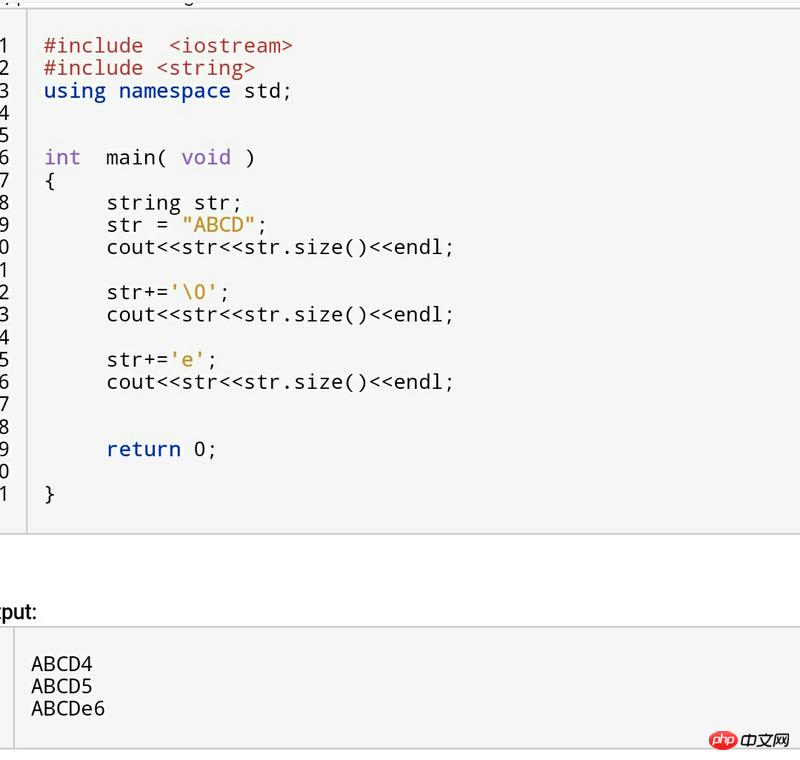大家讲道理2017-04-17 13:46:57

先上图
string 类型把' 0'当做普通字符处理,长度加一,可见' 0'不是结束字符,不含有特殊功能,string末尾不需加' 0'
C语言中没有string类型,而是用字符数组代替,一般字符数组可以不确定长度
char * string = " ABCD" ,编译器靠什么知道字符串结束,一般在后面加 ' 0'
高洛峰2017-04-17 13:46:57
C++ 中的std::string和 C-style string 是两种不同的字符串,前者是标准库中定义的一个类,后者是字符数组的别名。
C-style string:通常都以\0作为结尾。
std::string:标准中未规定需要\0作为字符串结尾。编译器在实现时既可以在结尾加\0,也可以不加。但是,当通过c_str()或data()(二者在 C++11 及以后是等价的)来把std::string转换为const char *时,会发现最后一个字符是\0(原因见文末附录)。
C-style string 中一般不能包含\0字符(因为这个字符被当作表示字符串结束的特殊字符处理了),如果包含这个字符,那么其后的字符将会被忽略。即:
char s[] = "ab\0c";
cout << s << endl; // 输出 ab而std::string没有这个限制。即:
std::string s{'a', 'b', '\0', 'c'};
//std::string s = "ab\0c"; // 这里由于是从 C-style string 构造 std::string,所以仍然会忽略 \0 之后的字符
cout << s << endl; // 输出 ab c通过c_str()或data()(二者在 C++11 及以后是等价的)来把std::string转换为const char *时,会发现最后一个字符是\0。想理解这个问题需要一点背景知识:
一,std::string 是 std::basic_string<CharT, Traits, Allocator>这个模板的特例std::basic_string<char>。即模板:
template<
class CharT,
class Traits = std::char_traits<CharT>,
class Allocator = std::allocator<CharT>
> class basic_string;中的参数CharT为char时的特例。
二,s.size()会返回std::string中字符的个数,即:
string s{'a', 'b', '\0', 'c'};
cout << s.size() << endl; // 输出 4
s += '\0';
s += 'd';
cout << s.size() << endl; // 输出 6三,使用[]运算符(即std::basic_string::reference std::basic_string::operator[](size_type pos);)获取std::string中的字符时,其字符的范围pos是从0到size()。其中0到size()-1是所存储的字符,而对于pos == size()有如下规定:
If
pos == size(), a reference to the character with valueCharT()(the null character) is returned. For the first (non-const) version, the behavior is undefined if this character is modified.
意思是当访问s[s.size()]时,会返回CharT()的返回值的引用,而CharT对于std::string是char,且char()返回的是\000,所以s[s.size()]会返回\0。
四,通过c_str()或data()(const CharT* c_str() const;)返回的指针访问字符串时,其效果为:
Returns: A pointer
psuch thatp + i == &operator[](i)for eachiin [0,size()].
即p[s.size()]等价于p + s.size()等价于&s.operator[](s.size())等价于s[s.size()],所以会发现返回值是\0。
巴扎黑2017-04-17 13:46:57
c语言用char*指针作为字符串时,在读取字符串时需要一个特殊字符0来标记指针的结束位置,也就是通常认为的字符串结束标记。
而c++语言则是面向对象的,长度信息直接被存储在了对象的成员中,读取字符串可以直接根据这个长度来读取,所以就没必要需要结束标记了。而且结束标记也不利于读取字符串中夹杂0字符的字符串。
参照std::string的实现 bits/basic_string.h大家讲道理2017-04-17 13:46:57
String本身是封装过的,会把'\0'在调用的时候给去掉,但实际上存储的时候还是有'\0'的
不管是用data()还是c_str()获取到的字符串都是一样的
#include <iostream>
#include <stdio.h>
#include <string>
using std::string;
using namespace std;
void test1(){
string s1 = "Hello";
const char * v1 = s1.data();
printf("0x%.2x\n", v1[s1.size()]);
string *s2 = new string("Hello");
const char * v2 = s2->data();
printf("0x%.2x\n", v2[s2->size()]);
}
void test2(){
string s1 = "Hello";
const char * v1 = s1.c_str();
printf("0x%.2x\n", v1[s1.size()]);
string *s2 = new string("Hello");
const char * v2 = s2->c_str();
printf("0x%.2x\n", v2[s2->size()]);;
}
int main()
{
test1();
test2();
return 0;
}
输出都是0x00